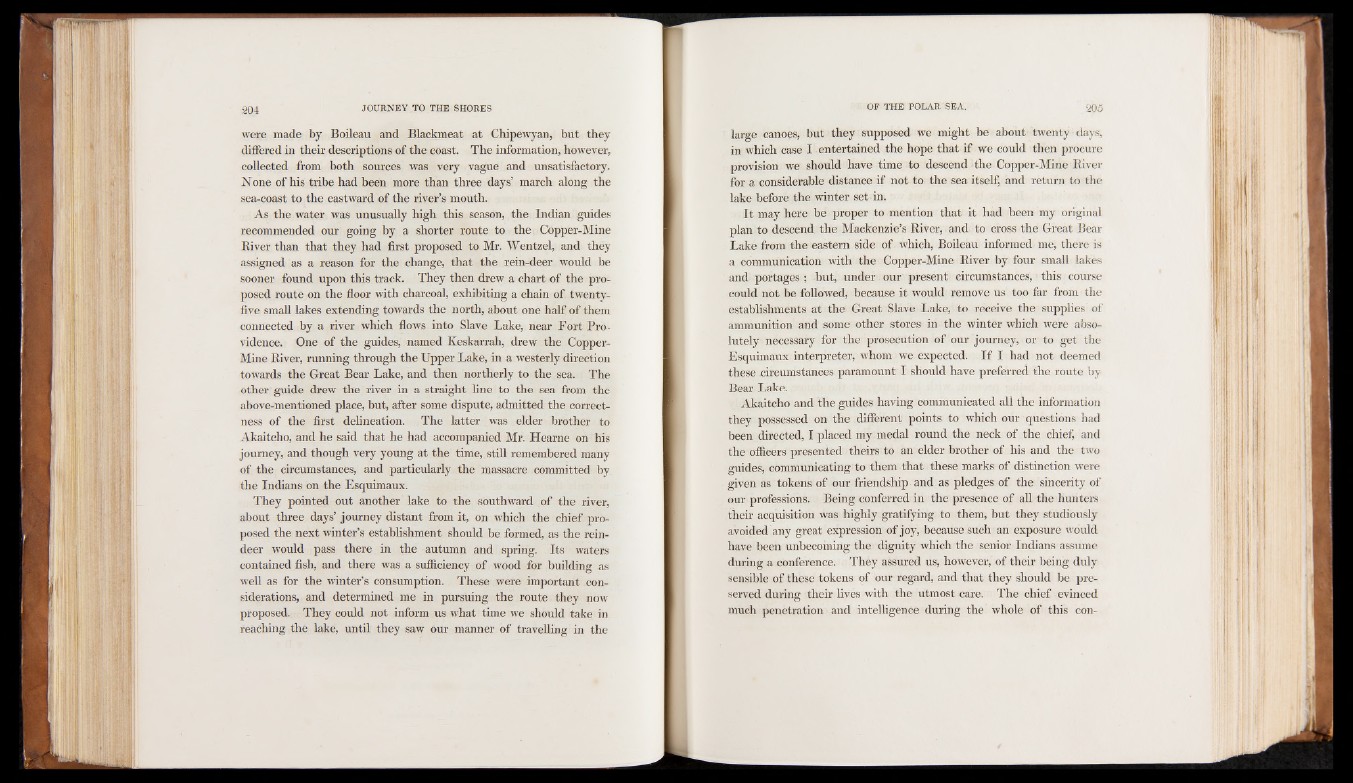
were made by Boileau and Blackmeat at Chipewyan, but they
differed in their descriptions of the coast. The information, however,
collected from both sources was very vague and unsatisfactory.
None of his tribe had been more than three days’ march along the
sea-coast to the eastward of the river’s mouth.
As the water was unusually high this season, the Indian guides
recommended our going by a shorter route to the Copper-Mine
River than that they had first proposed to Mr. Wentzel, and they
assigned as a reason for the change, that the rein-deer would be
sooner found upon this track. They then drew a chart of the proposed
route on the floor with charcoal, exhibiting a chain of twenty-
five small lakes extending towards the north, about one half of them
connected by a river which flows into Slave Lake, near Fort Providence.
One of the guides, named Keskarrah, drew the Copper-
Mine River, running through the Upper Lake, in a westerly direction
towards the Great Bear Lake, and then northerly to the sea. The
other guide drew the river in a straight fine to the sea from the
above-mentioned place, but, after some dispute, admitted the correctness
of the first delineation. The latter was elder brother to
Akaitcho, and he said that he had accompanied Mr. Hearne on his
journey, and though very young at the time, still remembered many
of the circumstances, and particularly the massacre committed by
the Indians on the Esquimaux.
They pointed out another lake to the southward of the river,
about three days’ journey distant from it, on which the chief proposed
the next winter’s establishment should be formed, as the reindeer
would pass there in the autumn and spring. Its waters
contained fish, and there was a sufficiency of wood for building as
well as for the winter’s consumption. These were important considerations,
and determined me in pursuing the route they now
proposed. They could not inform us what time we should take in
reaching the lake, until they saw our manner of travelling in the
large canoes, but they supposed we might be about twenty days,
in which case I entertained the hope that if we could then procure
provision we should have time to descend the Copper-Mine River
for a considerable distance if not to the sea itself, and return to the
lake before the winter set in.
It may here be proper to mention that it had been my original
plan to descend the Mackenzie’s River, and to cross the Great Bear
Lake from the eastern side of which, Boileau informed me, there is
a communication with the Copper-Mine River by four small lakes
and portages 4 < but, under our present circumstances, this course
could not be followed, because it would remove us too far from the
establishments at the. Great Slave Lake, to receive the supplies of
ammunition and some other stores in the winter which were absolutely
necessary for the prosecution of our journey, or to get the
Esquimaux interpreter, whom we expected. If I had not deemed
these circumstances paramount I should have preferred the route by
Bear Lake.
Akaitcho and the guides having communicated all the information
they possessed on the different points to which our questions had
been directed, I placed my medal round the neck of the chief, and
the officers presented theirs to an elder brother of his and the two
guides, communicating to them that these marks of distinction were
given as tokens of our friendship and as pledges of the sincerity of
our professions. Being conferred in the presence of all the hunters
their acquisition was highly gratifying to them, but they studiously
avoided any great expression of joy, because such an exposure would
have been unbecoming the dignity which the senior Indians assume
during a conference. They assured us, however, of their being duly
sensible of these tokens of our regard, and that they should be preserved
during their lives with the utmost care. The chief evinced
much penetration and intelligence during the whole of this con